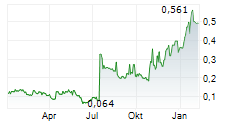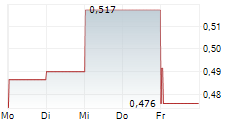LUND, SE / ACCESS Newswire / April 29, 2025 / Cantargia (STO:CANTA)
Atopic dermatitis (AD) is a very common, heterogeneous and debilitating disease with a need for new treatment options
CAN10 targets several pathways relevant for AD but distinct from current treatments' mode of action
A pilot phase 2 study will test CAN10 in a subgroup of patients with moderate to severe AD not responding to current first line biologic treatment
Clinical results expected within 12 months of study initiation
Cantargia (Cantargia AB (publ); Nasdaq Stockholm:CANTA) today announced the selection of a subgroup of atopic dermatitis (AD) patients, not responding to first line dupilumab treatment, as its second target indication for CAN10. Cantargia has received strong support from key opinion leaders in developing CAN10 for AD and will test it in a subset of patients where targeting of other pathways has failed. This indication will complement CAN10's lead indication, hidradenitis suppurativa (HS) and align with the project's initial focus on inflammatory dermatological diseases. The clinical study will be a pilot Phase 2 study that can start in parallel with the HS trial with data expected within 12 months of study initiation.
"As Atopic Dermatitis is an immunologically and phenotypically heterogenous disease, which can involve both the innate and adaptive parts of the immune system, targeting the broad IL-1 family of cytokines by blocking IL1RAP appears promising, and could be very effective, even in the around 10% of people with moderate to severe AD who are complete non-responders to IL-4 and IL-13 blockage.", said Prof. Thomas Bieber, MD, PhD, MDRA, Professor of Dermatology and Allergy, Davos and Zurich, Switzerland
CAN10 is an antibody against IL1RAP designed to potently inhibit the activity of the pro-inflammatory and disease promoting cytokines of the IL-1-family, namely IL-1, IL-33 and IL-36. CAN10 is currently being evaluated in a phase 1 clinical trial with safety as the primary objective. The phase 2 study in the lead indication HS is expected to start towards the end of the year.
AD is an inflammatory dermatological condition, which, like HS, is driven by a broad range of inflammatory signals. The prevalence of adult AD is 2.1% to 4.9% across countries, with around 50% moderate, and around 2-8% severe. First line biologic treatment is most often dupilumab, which blocks signaling of the type 2 inflammatory mediators IL-4 and IL-13, but only about 1 out of 3 is optimally treated with dupilumab suggesting that AD is a heterogenous disease with a need for new treatment options. CAN10 targets several pathways relevant for AD but the mode of action is different compared to current treatments, giving CAN10 an opportunity to target AD patients not responding to first line treatment.
"It is clear that the potential of CAN10 includes targeting inflammatory diseases, where activation of very broad inflammatory pathways challenges the specific targeting of individual cytokines. Therefore, we believe that positioning CAN10 for treatment of resistant atopic dermatitis, where a significant unmet medical need remains, can benefit many people", said Morten Lind Jensen, Chief Medical Officer of Cantargia.
For further information, please contact
Damian Marron, Interim CEO
Telephone: +46 (0)46-275 62 60
E-mail: damian.marron@cantargia.com
About Cantargia
Cantargia AB (publ), reg. no. 556791-6019, is a biotechnology company that develops antibody-based treatments for life-threatening diseases and has established a platform based on the protein IL1RAP, involved in a number of cancer forms and inflammatory diseases. Cantargia's oncology program, the antibody nadunolimab (CAN04), is being studied clinically, primarily in combination with chemotherapy with a focus on pancreatic cancer, non-small cell lung cancer and triple-negative breast cancer. Positive data for the combinations indicate stronger efficacy than would be expected from chemotherapy alone. Cantargia's second development program, the antibody CAN10, blocks signaling via IL1RAP in a different manner than nadunolimab and addresses treatment of serious autoimmune/inflammatory diseases, with initial focus on hidradenitis suppurativa and systemic sclerosis.
Cantargia is listed on Nasdaq Stockholm (ticker: CANTA). More information about Cantargia is available at www.cantargia.com .
About CAN10
The CAN10 antibody binds strongly to its target IL1RAP and has a unique capability to simultaneously inhibit signaling via IL-1, IL-33 and IL-36. Inhibition of these signals can be of significant value in the treatment of several inflammatory or autoimmune diseases. The initial focus of CAN10 will be on two severe diseases: hidradenitis suppurativa (HS) and treatment resistant atopic dermatitis (AD). In preclinical in vivo models of inflammatory diseases, such as systemic sclerosis, psoriasis, psoriatic arthritis, atherosclerosis, myocarditis and peritonitis, a CAN10 surrogate antibody significantly reduced the development of the disease. A clinical phase 1 study, investigating CAN10 in healthy volunteers and psoriasis patients, is ongoing. Good safety is shown at the completed dose levels, and additional data are expected continuously during 2025.
Attachments
Cantargia announces selection of treatment resistant atopic dermatitis as second target indication for CAN10
SOURCE: Cantargia


